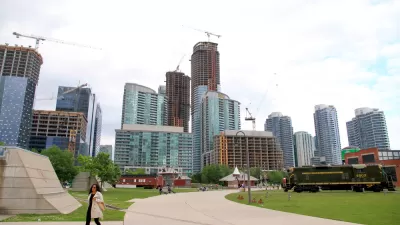Since it began in 1999, Toronto's condo boom has added 120,000 units to the city and, in the process, transformed its urban landscape. City leaders are just now beginning to address how to accommodate these new residents.
"In the last decade, the condo boom in Toronto has stacked the skyline with towers. Now, the approximately 250,000 to 275,000 people who live in them say that, in the race to build, city planners and councillors failed to adequately consider how to create neighbourhoods," reports Dave McGinn. "But the city is finally starting to listen."
“'I don’t think we anticipated, say, five years ago, or even before that, that this boom was going to continue,' says Peter Moore, project manager for the City of Toronto. Last month, the city launched the first of its kind series of public consultations to improve conditions for condo dwellers. The initiative is an acknowledgment that Toronto’s condo culture is here to stay." From poor condo construction to inadequate green space, participants' concerns extended from inside their units to the larger neighborhood.
“We need to be thinking much more extensively about … condos not as buildings but as part of a neighbourhood,” says Jennifer Keesmaat, the city’s chief planner. “We’re seeing a significant transition in the landscape and the form of the city at this moment that really is the impetus for us beginning to think in new ways about how neighbourhoods are defined in the city.”
FULL STORY: How can Toronto blend condos and community?

Maui's Vacation Rental Debate Turns Ugly
Verbal attacks, misinformation campaigns and fistfights plague a high-stakes debate to convert thousands of vacation rentals into long-term housing.

Planetizen Federal Action Tracker
A weekly monitor of how Trump’s orders and actions are impacting planners and planning in America.

In Urban Planning, AI Prompting Could be the New Design Thinking
Creativity has long been key to great urban design. What if we see AI as our new creative partner?

King County Supportive Housing Program Offers Hope for Unhoused Residents
The county is taking a ‘Housing First’ approach that prioritizes getting people into housing, then offering wraparound supportive services.

Researchers Use AI to Get Clearer Picture of US Housing
Analysts are using artificial intelligence to supercharge their research by allowing them to comb through data faster. Though these AI tools can be error prone, they save time and housing researchers are optimistic about the future.

Making Shared Micromobility More Inclusive
Cities and shared mobility system operators can do more to include people with disabilities in planning and operations, per a new report.
Urban Design for Planners 1: Software Tools
This six-course series explores essential urban design concepts using open source software and equips planners with the tools they need to participate fully in the urban design process.
Planning for Universal Design
Learn the tools for implementing Universal Design in planning regulations.
planning NEXT
Appalachian Highlands Housing Partners
Mpact (founded as Rail~Volution)
City of Camden Redevelopment Agency
City of Astoria
City of Portland
City of Laramie



























